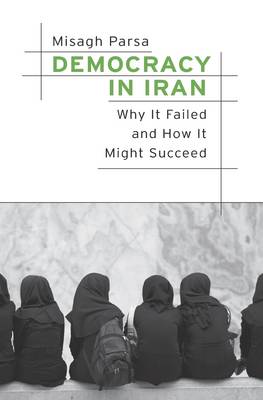7%OFF
Stock image for illustration purposes only - book cover, edition or condition may vary.
Democracy in Iran: Why It Failed and How It Might Succeed
Professor Of Sociology Misagh Parsa
FREE Delivery in Ireland
Description for Democracy in Iran: Why It Failed and How It Might Succeed
Hardcover. Num Pages: 416 pages. BIC Classification: HR. Dimension: 166 x 243 x 35. Weight in Grams: 746.
The Green Movement protests that erupted in Iran in 2009 amid allegations of election fraud shook the Islamic Republic to its core. For the first time in decades, the adoption of serious liberal reforms seemed possible. But the opportunity proved short-lived, leaving Iranian activists and intellectuals to debate whether any path to democracy remained open. Offering a new framework for understanding democratization in developing countries governed by authoritarian regimes, Democracy in Iran is a penetrating, historically informed analysis of Iran's current and future prospects for reform. Beginning with the Iranian Revolution of 1979, Misagh Parsa traces ... Read morethe evolution of Iran's theocratic regime, examining the challenges the Islamic Republic has overcome as well as those that remain: inequalities in wealth and income, corruption and cronyism, and a brain drain of highly educated professionals eager to escape Iran's repressive confines. The political fortunes of Iranian reformers seeking to address these problems have been uneven over a period that has seen hopes raised during a reformist administration, setbacks under Ahmadinejad, and the birth of the Green Movement. Although pro-democracy activists have made progress by fits and starts, they have few tangible reforms to show for their efforts. In Parsa's view, the outlook for Iranian democracy is stark. Gradual institutional reforms will not be sufficient for real change, nor can the government be reformed without fundamentally rethinking its commitment to the role of religion in politics and civic life. For Iran to democratize, the options are narrowing to a single path: another revolution. Show Less
Product Details
Publisher
Harvard University Press
Place of Publication
Cambridge, Mass, United States
Shipping Time
Usually ships in 7 to 11 working days
About Professor Of Sociology Misagh Parsa
Misagh Parsa is Professor in the Department of Sociology at Dartmouth College.
Reviews for Democracy in Iran: Why It Failed and How It Might Succeed
Misagh Parsa's account of Iran is one of the most important books published about the Islamic Republic since its inception. Parsa's mastery of an impressive range of sources, his elegant writing style and his intellectual honesty set his account apart from the legion of other books published on the theocratic state. His conclusions are as stark as they are important: ... Read morethe Islamic Republic cannot reform itself, and its path to genuine democratisation can only come through an actual revolution.
(04/01/2017) In this erudite and intellectually challenging book, sociologist Parsa seeks to tackle a fundamental question of democratization theory
namely, under what conditions can a country achieve democratization? In answering this question, Parsa uses Iran as a case study. He frames the case of Iran in a broad comparative perspective. He analyzes alternative routes of democratization and explains why South Korea succeeded in democratizing through reform, whereas countries like the Philippines and Indonesia experienced tumultuous and violent upheavals on their paths toward democratization.
(03/01/2017) This fine book shreds the dominant narratives about the Islamic Republic as Parsa analyzes the titanic struggle under way in Iran between theocracy and democracy. Along the way, the author shows why gradual reform
the leitmotif for Western supporters of 'pragmatic' Iranian president Hassan Rouhani and of the Obama administration's nuclear deal
is unlikely. Parsa digs deep into Persian primary material often ignored in Washington policy discussions, intelligence analysis and journalism. He also mines data from other authoritarian countries to compare and contrast those that have transformed peacefully with those that have changed more violently but still democratically (Indonesia) or erupted and returned to dictatorship (Egypt). Parsa's careful scholarship leads him to one overarching conclusion: A peaceful evolution to a more humane system in the Islamic Republic, let alone a more democratic one, isn't in the cards...While anyone curious about Iran will find it illuminating, for those working in government or the foreign-affairs community, it is mandatory reading...[This] book is easily the most important work in English on the Islamic Republic since the revolution.
(06/20/2017) Misagh Parsa's brilliantly argued Democracy in Iran posits a new revolutionary future for the country, suggesting that as the gap between ruler and ruled widens, and as the different sides in Iran's political spectrum become ever more entrenched, the prospect
or necessity
of dramatic upheaval becomes ever more real...She shows us how the Islamic Republic is in danger of becoming as laughable in the distance between reality and propaganda as the Soviet Union became.
Anthony Forbes Times Literary Supplement (05/10/2017) For decades now, Parsa has thrown shafts of illumination on social movements and politics in Iran by sidestepping the polemics and theology to apply the tools of hard-nosed sociological analysis. Here he has analyzed Iran's Green Movement in the same incisive way, and anyone who wants to understand the contemporary situation in that country
as opposed to the fantasies constructed by think tanks and opinion page editors inside the Beltway
must read this book.
Juan Cole, author of The New Arabs: How the Millennial Generation Is Changing the Middle East This book deals with an important and timely issue: the difficulties of democratizing the Islamic Republic. Drawing from a wealth of primary materials
interviews, newspapers, and recent memoirs
Democracy in Iran is the first work that focuses on the movement as a social movement, with a basis in the larger society, and contains valuable insights on problems of democratization.
Ervand Abrahamian, author of The Coup: 1953, the CIA, and the Roots of Modern U.S.-Iranian Relations Show Less


